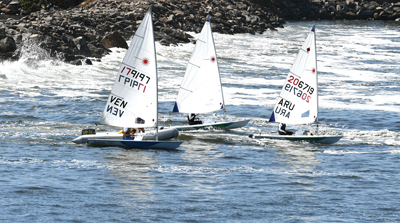If the sports industry needs a potent reminder of how dependent it is on healthy ecosystems, the Olympics in Rio de Janeiro is providing it. According to an investigation by The Associated Press cited in The New York Times, water-quality tests of the waters in which Olympic athletes will swim and sail revealed disease-causing viruses at “levels 1.7 million times of what would be considered hazardous on a Southern California beach.”
The level of untreated sewage, feces and other human waste produced by Rio’s 6 million inhabitants, along with hazardous chemicals, municipal garbage, dead fish and even dead human bodies contaminating Guanabara Bay and the other waterways to be used by Olympic athletes would close any beach in North America or Europe. Rivers that begin as pristine streams in the mountains above Rio have been described as “pure sludge” by the time they reach the Bay, and a pediatrician in Rio, Dr. Daniel Becker, is quoted as warning that “athletes will literally be swimming in human crap … .” Nigel Cochrane, a coach for the Spanish sailing team said, “It’s disgusting. We’re very concerned.”
He should be: The waters around Rio to be used during the Olympics host viruses, bacteria and parasites that cause hepatitis A, amoebiasis, shigellosis, cholera, cryptosporidiosis, giardia, which all contribute to severe diarrhea, and other waterborne illnesses that kill more than 6,000 people each day, 2.2 million people each year, mostly children.
 |
Sailors and marathon swimmers will compete in polluted Guanabara Bay over the next 2 weeks.
Photo by: GETTY IMAGES
|
Michelle Lemaitre, the director of sustainability at the International Olympic Committee, is a brilliant and committed environmentalist. I can only imagine the despair that she and her committed colleagues at the IOC feel about the ecological conditions plaguing the Rio Olympics. Most frustrating of all is the fact that the major public health threats faced by athletes and spectators alike at Rio are largely outside of the IOC’s control and, indeed, grossly violate the environmental commitments made by Brazil to the IOC in its 2009 bid to host the Games.
In order to be selected as a host of the Olympic Games, potential host cities must prepare a detailed environmental plan. The Olympic Charter stipulates that, “The Olympic Games are [to be] held in conditions which demonstrate a responsible concern for environmental issues.” In its submission to host the Games, Brazil pledged to commit $4 billion to clean up Guanabara Bay and other water bodies that will be used by Olympic swimmers and sailors.
However, according to new reports, less than $175 million was spent for this purpose. Brazil is not the first Olympic country to ignore its obligation to attend to environmental issues: China promised to clean up air pollution in and around Beijing before the 2008 Summer Games, but it didn’t; and the Sochi Games destroyed pristine, ecologically rare and protected areas, wiping out forested areas, scattering wastes and adversely affecting wildlife.
 |
Sailors train in Rio ahead of the Olympics.
Photo by: GETTY IMAGES
|
That this Olympic-sized ecological debacle is occurring now is ironic, given that during the past decade the sports industry globally has been more focused than ever on responsible environmental stewardship. Ten years ago the first professional sports league greening collaboration was launched between Major League Baseball and the Natural Resources Defense Council. Today, virtually all commissioners of professional sports leagues in the U.S. and throughout Europe, including the IOC, have made commitments to environmental stewardship and are actively encouraging the teams in their leagues to incorporate sustainable measures into their operations.
Indeed, the sports greening movement is changing the way venues are designed and operated, and it is changing the operating culture of sports leagues and teams. Because of this, millions of pounds of carbon emissions have been avoided, millions of gallons of water have been saved, and millions of pounds of waste are being shifted toward recycling or eliminated altogether. Ecologically enhancing the way sports venues are operated, and using sports media platforms to promote environmental messages, holds the potential to influence the behavior of billions of people, billions of fans and a global supply chain that touches every industry.
The Rio Games reveal that much of what the sports industry wants to do for the environment is being stymied by inadequate ecological infrastructure out of the control of sports leagues, venues and teams, including the IOC. Sanitation systems are lacking, allowing pollutants like sewage, chemicals, plastics and other garbage to run freely into waterways, making swimming, boating, surfing and fishing impossible. Millions of pounds of uneaten food are wastefully dumped into landfills instead of being donated or composted due to the absence of ecologically smart food waste processing facilities. Auto-based fan transportation contributes 60 percent or more of the greenhouse gases associated with a typical sporting event because of underdeveloped mass transit.
The Games we love today were born outdoors, and without clean air, clean water and a healthy climate, sports would be impossible. And as the Rio Olympics make clear, it is the availability of these ecological services that makes sports possible.
Can the sports industry save the planet on its own? No, it cannot. But lessons from Rio’s ecological debacle can shift cultural attitudes and begin to move government priorities and the market toward the more sustainable practices we urgently need to adopt if life on earth is to continue.
The ecological debacle at the Rio Olympics teaches us that there is an urgent need to enhance our ecological infrastructure, especially in the developing world. The Games teach us that government and business leaders must devote the same level of effort to keeping our natural environment healthy that they devote to building stadiums and arenas.
Allen Hershkowitz (internationalgreensports@gmail.com) is co-founder and president emeritus of Green Sports Alliance and co-founder of Green Sports International.






